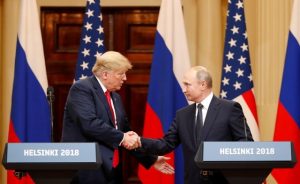
By Hyonhee Shin
SEOUL (Reuters) – Gasoline prices in North Korea have nearly halved since late March, market data analyzed by Reuters shows, adding weight to suspicions that fuel is finding its way into the isolated economy from China and elsewhere despite U.N. sanctions.
The United Nations Security Council passed a resolution in December to ban nearly 90 percent of refined petroleum exports to North Korea over its nuclear and missile programs.
But as North Korean leader Kim Jong Un has moved to improve relations with the United States, China and South Korea, concerns have grown that the policy of “maximum pressure” through sanctions and isolation, is losing steam.
Kim and U.S. President Donald Trump agreed to work toward denuclearization at their summit in Singapore on June 12. Experts say any fuel aid in breach of sanctions could erode the diplomatic progress.
China said on Tuesday it strictly abided by U.N. sanctions, but indicated it may have resumed some fuel shipments to North Korea in the second quarter of this year.
Gasoline was sold by private dealers in the North Korean capital Pyongyang at about $1.24 per kg as of Tuesday, down 33 percent from $1.86 per kg on June 5 and 44 percent from this year’s peak of $2.22 per kg on March 27, according to Reuters analysis of data compiled by the Daily NK website. Diesel prices are at $0.85 per kg, down about 17 percent from March.
The website is run by North Korean defectors who collect prices via phone calls with multiple traders in the North after cross-checks to corroborate their information, offering a rare glimpse into the livelihoods of ordinary North Koreans.
In North Korea, gas is sold via informal channels such as street stalls and informal markets and by weight rather than by volume, as it is in South Korea, the United States and elsewhere, so North Koreans prefer to quote “per kg” rates, said Kang Mi-jin, who works at Daily NK. A 200 liter barrel of petrol holds around 180 kg.
U.S. prices stand at around 75 cents per liter or $2.839 per gallon.
“My assessment is that there was a greater inflow (of fuel supplies) from abroad, especially China since Kim’s trips there,” said Kang, who speaks regularly to sources inside North Korea.
Kim first visited China to meet President Xi Jinping in March, and they held two more summits, in May and June.
SANCTIONS
The latest fuel data comes amid mounting suspicion in Washington that North Korea may be using the recent diplomatic thaw to get a lifeline from China.
North Korea gets most of its fuel from China, its biggest trading partner, and some from Russia. Washington and Seoul officials have said the North imports some 4.5 million barrels of refined petroleum products and 2 million barrels of crude oil each year.
Last year’s U.N. resolution capped refined imports at 500,000 barrels a year.
Chinese Foreign Ministry spokesman Geng Shuang told reporters on Tuesday that China has consistently and strictly abided by U.N. Security Council resolutions on North Korea.
China had exported 7,432 tonnes of refined oil products to North Korea in the first six months of this year, out of a total of 60,000 tonnes a year stipulated by the U.N. sanctions.
China had reported its exports to the Security Council’s sanctions committee in a timely manner, Geng added.
“The relevant situation is totally open and transparent,” he said, without elaborating.
Since official Chinese customs data showed no gasoline and diesel exports to North Korea from January to March, Geng’s comments suggested China resumed some shipments some time after Kim and Xi’s first meeting.
Overall, China’s trade with North Korea in the first half of this year tumbled 56 percent on the back of the tightening sanctions, customs data showed on Monday.
Last week, U.S. Secretary of State Mike Pompeo accused North Korea of “illegally smuggling petroleum products into the country at a level that far exceeds quotas” established by the UN.
“Illegal ship-to-ship transfers are the most prominent means by which this is happening. Every UN member state must step up enforcement,” he wrote on Twitter, without naming any country.
China and Russia delayed a U.S. push last week for a UN Security Council panel to order a halt to refined petroleum exports to North Korea, asking for more detail on a U.S. accusation that Pyongyang breached sanctions, diplomats said.
The United States provided a list to the committee earlier this month of 89 illicit North Korean transactions and a few select photos, seen by Reuters.
Seoul’s foreign ministry said last week that the authorities were investigating two ships with Panama and Sierra Leone flags suspected to have illegally transferred North Korean coal into South Korea via Russia.
NO MAJOR SUFFERING
North Korean rice prices have also been stable since a spike last September, when the UN Security Council imposed new sanctions. Rice has hovered around $0.62 per kg throughout this year.
Stable fuel and rice prices suggest no immediate signs of major suffering in North Korea despite South Korea’s recent estimates the impoverished state’s economy contracted at its sharpest rate in two decades last year.
South Korea’s central bank said North Korea’s gross domestic product shrank 3.5 percent last year, marking the biggest decline since 1997, citing international sanctions and drought.
While other defectors reported some suffering in remote rural regions, Daily NK’s Kang said fuel demand has been steady in North Korea, and overall living conditions have improved in line with a booming unofficial market economy.
The unofficial markets, known as jangmadang, have grown to account for about 60 percent of the economy, according to the Institute for Korean Integration of Society.
“I’ve seen signs the economy was slowly improving over the past five years, and in last year things are still developing but perhaps not as fast as before,” a Western consultant who makes regular trips to North Korea told Reuters.
Kim, who vowed not to let the people “tighten their belt again” in his first-ever public speech in 2012, announced in April a shift in focus from nuclear programs to the economy. Analysts say that will be difficult while sanctions remain in place.
“I don’t think there is an outcry in the markets now, but there could be one toward the end of this year,” said Kim Byeong-yeon, a North Korea economy specialist at the Seoul National University.
(Reporting by Hyonhee Shin. Additional reporting by Josh Smith and Cynthia Kim in SEOUL and Ben Blanchard in BEIJING. Editing by Lincoln Feast.)











